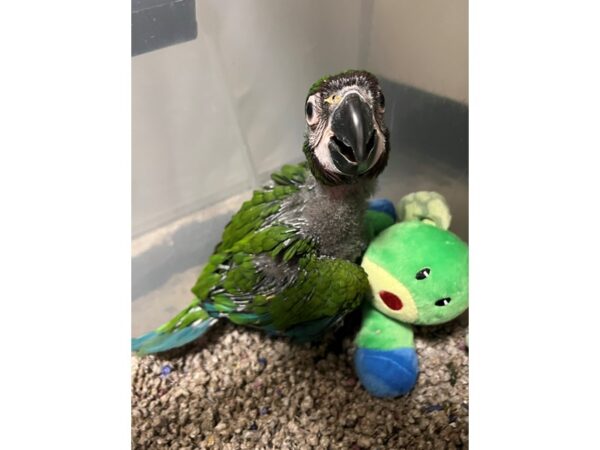Severe Macaw
The Severe Macaw, also known as the Chestnut-fronted Macaw (Ara severus), is a small to medium-sized macaw native to Central and South America. Here are some key details about this bird and how to care for it:
Description
Size: Severe Macaws are among the smaller macaw species, typically measuring about 45-50 cm (18-20 inches) in length, including their long tail feathers.
Appearance: They have predominantly green plumage with a chestnut-brown patch on their foreheads and blue flight feathers. They also have bare white facial patches lined with fine black feather lines.
Lifespan: With proper care, Severe Macaws can live 30 to 50 years in captivity.
Habitat
Distribution: These birds are found in the wild from Panama in Central America down to Bolivia and Brazil in South America.
Environment: Severe Macaws inhabit a variety of environments, including tropical rainforests, savannas, and areas along rivers. They are also seen in secondary forests and sometimes near human habitation.
Behavior
Social Structure: They are social birds, often seen in pairs or small flocks. They are known for their playful and curious nature.
Diet in the Wild: In their natural habitat, they feed on a variety of fruits, nuts, seeds, and vegetation. They may also consume insects and their larvae.
Care in Captivity
Diet: A balanced diet is crucial. Provide a high-quality commercial pellet supplemented with fresh fruits, vegetables, and nuts. Avoid feeding them chocolate, caffeine, alcohol, and avocado, as these can be toxic.
Housing: Severe Macaws need a large, sturdy cage to accommodate their active nature. The cage should be at least 3 feet wide, 2 feet deep, and 4 feet high. Provide plenty of perches of varying sizes and textures.
Enrichment: These intelligent birds require mental stimulation and physical activity. Provide a variety of toys, including chew toys, puzzles, and foraging toys. Regular out-of-cage time and interaction with their human caregivers are essential.
Social Interaction: Severe Macaws thrive on social interaction and can form strong bonds with their owners. They need daily attention and engagement to prevent boredom and behavioral issues such as feather plucking or screaming.
Training: Positive reinforcement training can help in managing their behavior and strengthening the bond between the bird and its owner. Training sessions should be short, consistent, and reward-based.
Health Care: Regular veterinary check-ups are essential. Watch for signs of illness such as changes in appetite, droppings, or behavior. Provide a clean environment to prevent infections and ensure they have access to fresh water at all times.
Common Challenges
Noise: Like most macaws, Severe Macaws can be noisy, especially if they are bored or seeking attention.
Chewing: They have strong beaks and an instinct to chew, so provide plenty of safe chewing materials.
Social Needs: Their high need for social interaction can be demanding. Ensure you have enough time and commitment to meet their needs.
 Adopted
Adopted